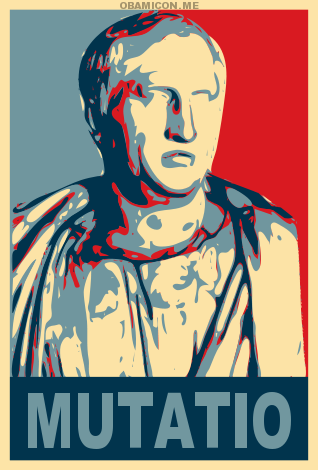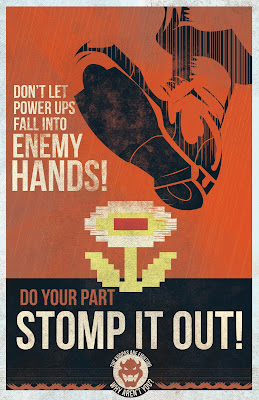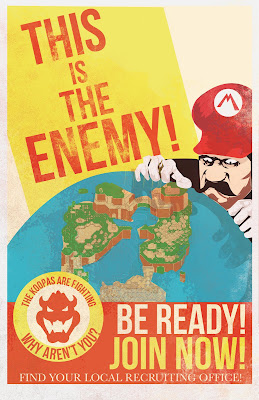We’re on holidays in Tasmania. It’s stunning. We’ve been to snow fringed lakes, and stunning bays, and we’re now enjoying historic Hobart. Yesterday, en route to Hobart, we spent some time in Port Arthur at the world heritage listed historic site that is the best preserved remnant of Australia’s convict history; it was a prison settlement, and like most historical sites the place itself, and its architecture, tells a story that functions as a backdrop to the stories of lives lived and lost in our nation’s past.
Port Arthur’s historical site, of course, occupies a more recent place in the Australian story and our national psyche. In 1996 it was the site of Australia’s last shooting massacre, when a young man named Martin Bryant entered the historic site and sprayed staff and visitors with bullets, taking 35 lives and leaving 23 people wounded. This shooting led to a significant change to Australia’s gun laws, and left an indelible mark on the historic site; where there’s now a moving tribute to those who were killed or wounded in the massacre, and to those brave people who rushed to the aid of the victims. It’s a solemn monument to a significant moment in our national story.
What fascinated me more than the conditions of the prisoners, government officers, and settlers in the historic site was the prominent space given to Christianity in the lives of both the convicts and the establishment. The church that met on the hill above the settlement hosted services attended by 1,100 people per Sunday. The building that hosted these gatherings was, from 1836, a grand, convict-built, sandstone structure in prime position on the hill; a prominent and unmissable reminder of the place of Christianity in the lives (and attempted reform) of those sent to the colony, a constant visible presence reminding those living in the community of the inherent dignity and value of all human life; a reminder it appears at least some of those in charge of life in the prisons took on board (according to the records quoted in signage on the site).
The parsonage — the home of the protestant minister who ran services at the church — made for interesting visiting and reading. It told the story of three of the chaplains to the community — the first, Rev Durham, was staunchly anti-Catholic, but also advocated for better treatment of prisoners, and for the church to be responsible for education in the community, and a letter from one of the convicts claimed that he’d won the respect of those he was sent to minister to — the convicts. The second chaplain, Reverend George Eastman, had a classic minister’s family, with kids who apparently ran amok, disrupting all sorts of things happening around the community; he too was held in high esteem in the community, but he died on site, and one of the signs in the parsonage particularly struck me, it quotes his epitaph. The words on his grave stone seemed to me to be great words for a preacher of the Gospel to aspire to, but also told the story of the role of the church in a settlement where death was common, and the church did indeed play a prominent role in helping us face our mortality; or rather to offer hope beyond death. The Port Arthur site includes a small island in the bay, the Isle of the Dead, which functioned as the cemetery.
“Long and earnestly the pastor laboured to bring souls to Christ, and oft on his calm isle proclaimed to mourning groups the Christian’s cheering hope. The joyful resurrection morn and Glorious immortality. He being dead yet speaketh. Hebrew X1.4” — Rev. George Eastman’s epitaph.
What stunning words. This man’s ministry to others in the face of death spoke from beyond the grave. A good kind of haunting. The kind that leads to hope; a testimony to glorious immortality for any who put their faith in Jesus. The best we Christians have to offer society; and perhaps the reason the church was so prominent in the early life of this settlement, and other parts of colonial Australia. The Hebrews quote is from a chapter of the Bible that speaks of faith.
Now faith is confidence in what we hope for and assurance about what we do not see. This is what the ancients were commended for.
By faith we understand that the universe was formed at God’s command, so that what is seen was not made out of what was visible.
By faith Abel brought God a better offering than Cain did. By faith he was commended as righteous, when God spoke well of his offerings. And by faith Abel still speaks, even though he is dead. — Hebrews 11:1-4
What a testimony to this man’s ministry and the place of the church in the colony. To a church operating as a city on a hill; a light in the darkness; a voice of hope beyond death. A position reinforced by the environment; a story told by this historic site.
But the story doesn’t end there… because the story of Port Arthur’s historic site is a haunting one; and perhaps more than anything else it is haunted by the loss of a voice like this, or a church like this. And perhaps here there is something of the story of our nation; a parallel haunting story.
The pastor who replaced Rev. Eastman, Rev Haywood, arrived to a settlement in decline; the prison was closing, and to top things off, he started to believe that the parsonage was haunted by ghosts; perhaps Eastman’s. He moved out of the house, then left the settlement in 1877 when the prison closed. The parsonage became the post office. Christianity was moving away from the centre of the community. 7 years later the church building caught fire, just the outer walls remain; a haunting but powerful monument to the place of religion in a site littered with buildings in similar state of disrepair; none are quite so grandly designed or constructed as this building though.
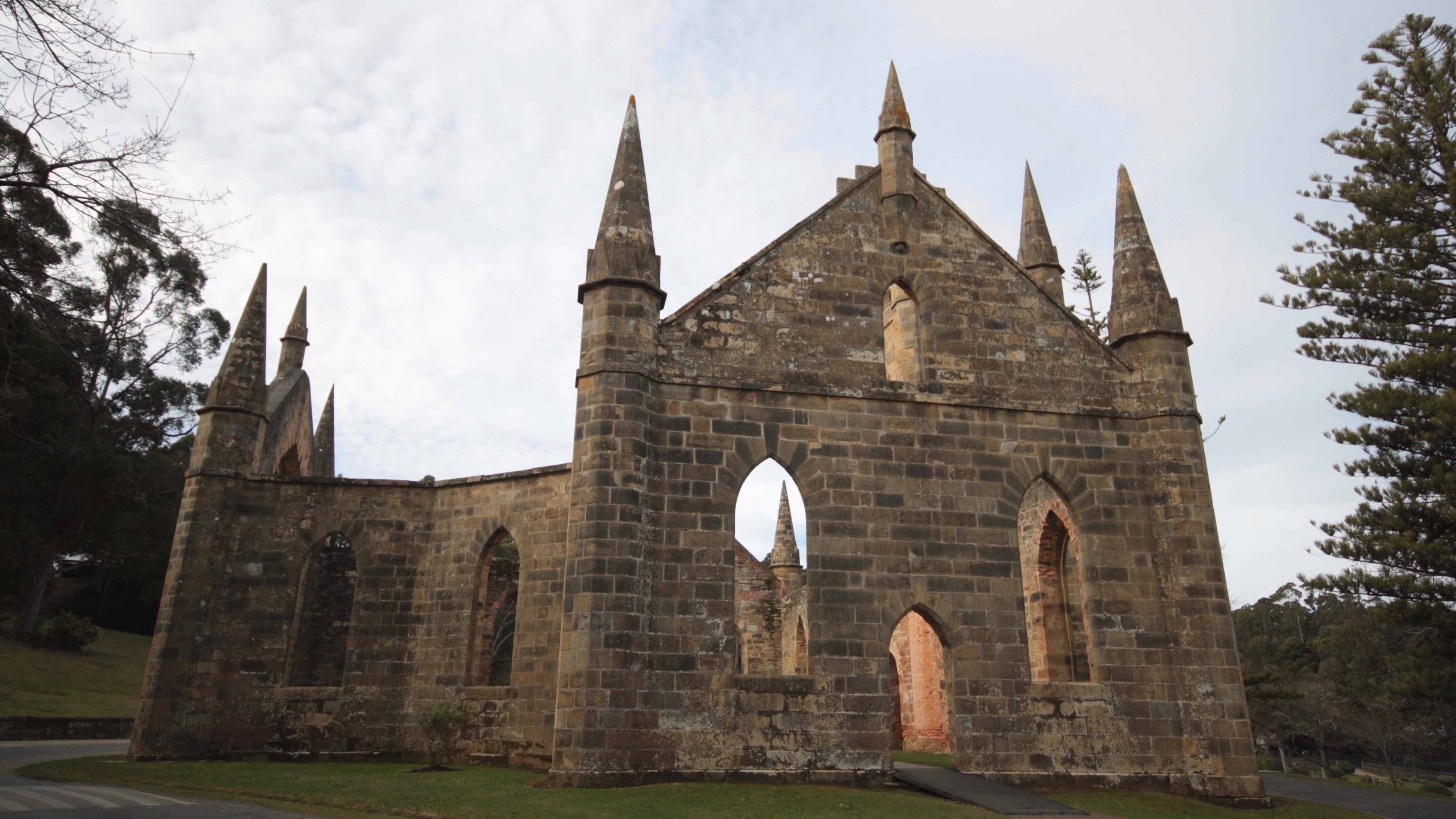
Next to the old church is a much smaller chapel style building, St Davids, which still functions as an Anglican church to this day. When it was commissioned in 1927, the local paper wrote: it’s “a pretty little building, erected in a prominent position in the township in the shadows of the ruins of the old church. It is a welcome addition to the buildings of the township” (the page of the paper available at that link has an interesting little report on a church service at Davey Street Methodist where the address was given by miss Barbara Storey — which tells two fascinating stories about the church in 1927, one being that sermons were summarised in the city’s newspaper, the other being about women preaching not being particularly newsworthy). Prior to the construction of St David’s (in the 50 year gap between 1877 and 1927) services had been conducted in Port Arthur’s town hall, the old Asylum. Now this quaint little building runs regular services in the shadow of a grand, but skeletal, church building that was the town’s most prominent structure; it looks like it could comfortably seat 40 people; it’s a haunting story about the place of the church in Australia; but not the only part of the site that tells this haunting story. Where once there was a grand building, serving 1,100 people per Sunday with the hope of the resurrection, and helping people confront death, now there is this quaint building — that once made the newspaper — providing a handful of tourists, and perhaps some locals, that same message.
The church still has a place in Port Arthur, it’s still kicking along, but it is part of an historic site; a tourist attraction, a relic of an Australia past; representing something every bit as ghostly as the other stories of the past you’re confronted with in your walk around the site, and offering something about as plausible to the average Aussie punter as Rev. Haywood’s ghost sightings.
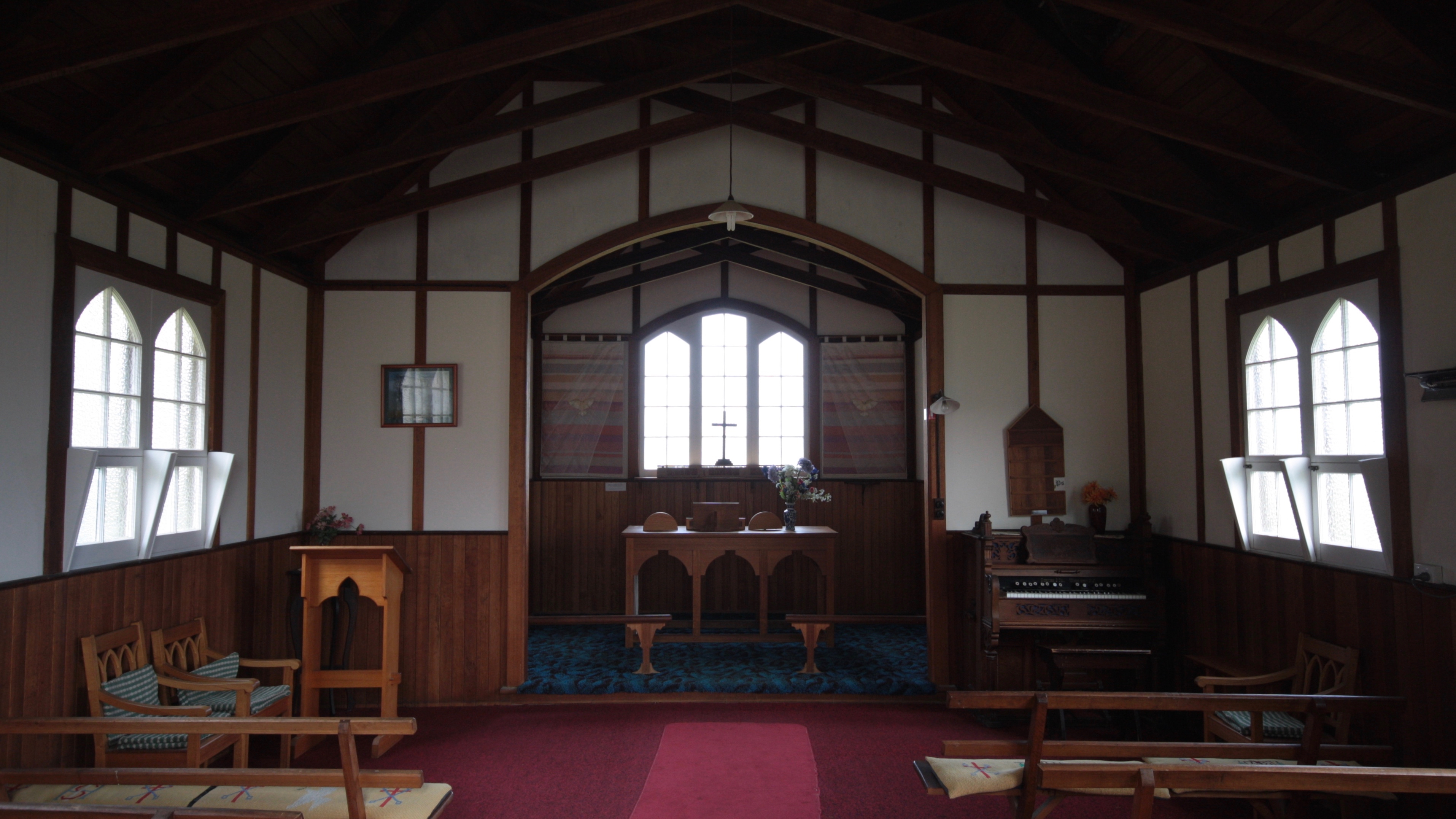
This wasn’t the most haunting part of our tour of Port Arthur for me. I’m more into ancient history and recent history than the history of colonial Australia; and I can remember exactly where I was, as a 13 year old kid, when I first learned about the Port Arthur shooting. It was a Sunday. I was at youth group, sitting on the stage steps inside the Presbyterian Church building in Maclean, and some of my friends were talking about it. It’s one of those news stories where you remember where you first hear it… It left an indelible mark on my memory; a haunting. Even.
The memorial garden and ‘Pool of Peace’ are a stirring reminder of this moment in our history; I saw a bloke probably a couple of years older than me, sitting quietly and contemplatively on the corner of the pool for a few minutes, perhaps, as I was, pondering the fragility of human life; being confronted by the spectre of death; haunted, still, by the events of 21 years ago. It’s hard to know what to say in response to death, which is why our mortality and the fragility of life is confronting, perhaps it is why the original settlement buried its dead on an island, a boat trip away from the day to day reality; the water providing a buffer between the mundane and its inevitable end; with the church and the ministry of somebody like Rev. Eastman helping to bridge that gap, and providing the comforting picture of “glorious immortality” — the early settlers seemed to grasp that being confronted by death without being comforted by immortality is something more than haunting; more than ghostly; it is ghastly.
But the memorial, in the main, reminds us of the haunting Aussie story; what we’ve lost because we’ve lost the prominent place of people like Rev. Eastman, and the church has gone from being a prominent visual part of life in our community, to having a small presence in the shadows. So. The ‘Pool of Peace’ offers a thoroughly secular response to the events of 1996; haunting words engraved next to the pool and on its edges, another epitaph, in stark contrast to the words on Eastman’s gravestone:
“Death has taken its toll
Some pain knows no release
But the knowledge of brave compassion
Shines like a pool of peace.
May we who come to this garden
Cherish life for the sake of those who died
Cherish compassion for the sake of those who gave aid
Cherish peace for the sake of those in pain.”
These are poetic words. They aren’t without a sort of limited hope, and in some ways they are words that allow the victims of Port Arthur to do what Rev. Eastman does; to keep speaking; to speak of the cost of evil, and the pain and grief that comes through death. You can’t help but be moved by that garden, these words, and the still waters of the pool; tucked into a part of a site that tells a bigger story of Australian life.
Somehow Eastman’s testimony, his epitaph, stands in stark relief to these words though, and somehow this is where the church might still have a role to play in Australia, even if it is to keep us feeling haunted by ghosts of a past we’ve lost, a place we once had… with a message of ‘cheering hope’ that comforts us in our own ‘isle of the dead’, that comforts us as we stand beside graves, or on sites where death has touched us, or haunted us.
“Long and earnestly the pastor laboured to bring souls to Christ, and oft on his calm isle proclaimed to mourning groups the Christian’s cheering hope. The joyful resurrection morn and Glorious immortality. He being dead yet speaketh. Hebrew X1.4” — Rev. George Eastman’s epitaph.
The church is not yet dead; even if it is starting to feel like a bit of a ghost story, or something that haunts our society rather than comforts it. And there’s a small monument to this in the memorial garden too; and perhaps the brightest moment of our trip came from this monument, this sculpture of the cross with the names of those who lost their lives engraved on a plaque, tucked back in the shadows; behind the ‘pool of peace’; a reminder of the prince of peace, the one whose resurrection secures our glorious immortality; the one who spoke life in the beginning, but who also spoke from beyond the grave.
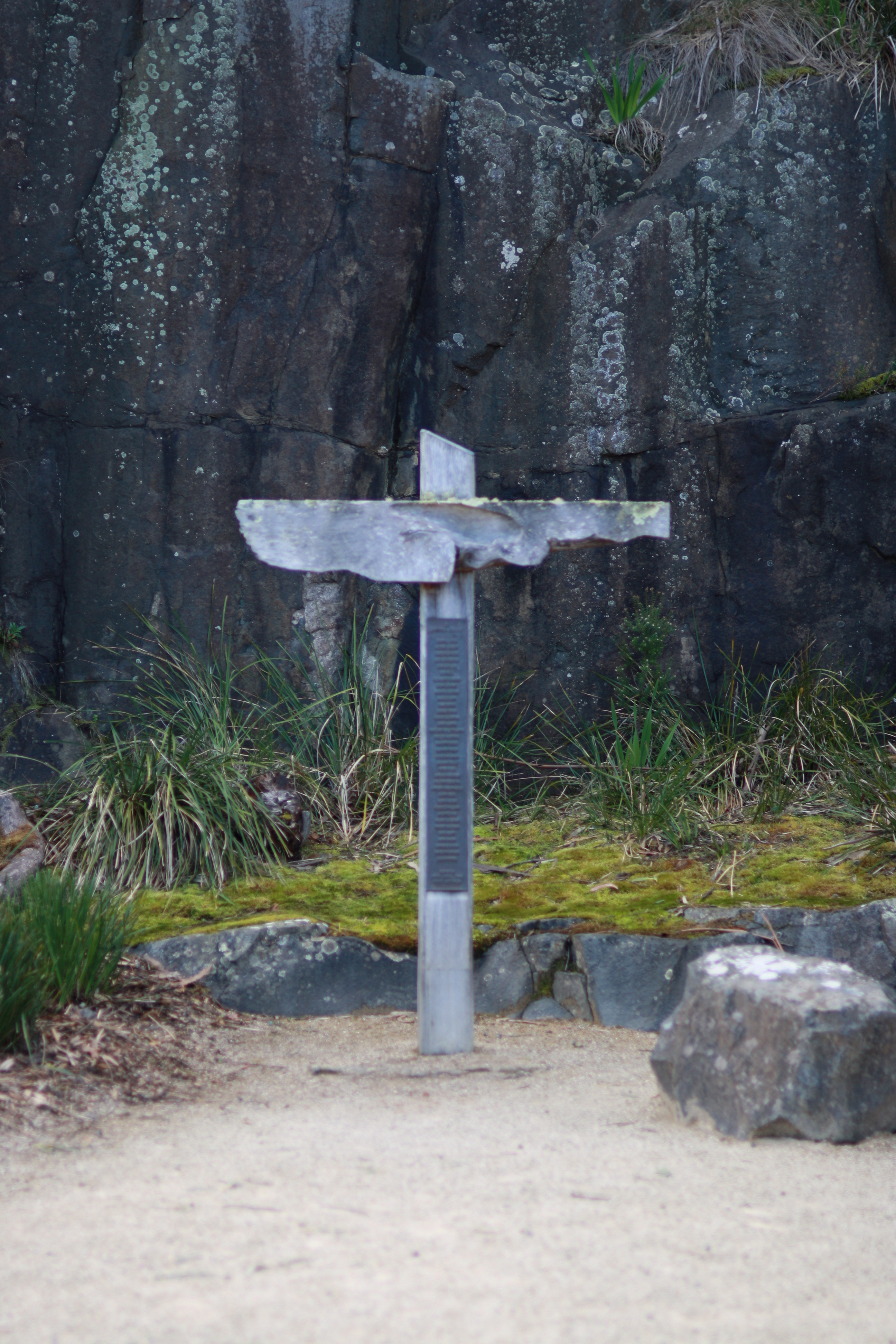
As we rounded the corner, through a tall hedge, into the monument, there were a couple of kids playing underneath this cross. One, a young girl, stretched out her arms and yelled out, breaking the stillness — her voice rippling across the pool — “Mummy! Mummy! I’m dying on the cross like Jesus”… the man sitting peacefully on the edge of the pool looked up, shocked at this breach of the peace, the girl’s mum hushed her, and beckoned her back to her side.
I smiled. I couldn’t help myself. As I caught the eyes of the sombre fountain sitter. He wasn’t smiling, though his eyes were, a little. As we walked up to the inscriptions on the edge of the pool, I heard this girl explaining the Jesus story to her sister. “They killed Jesus on a cross like that, then they put him in a tomb… and then…”
And then.
Haunting.
Cheering hope. Resurrection. Glorious immortality. He being living yet speaketh.
Even in Australia.
